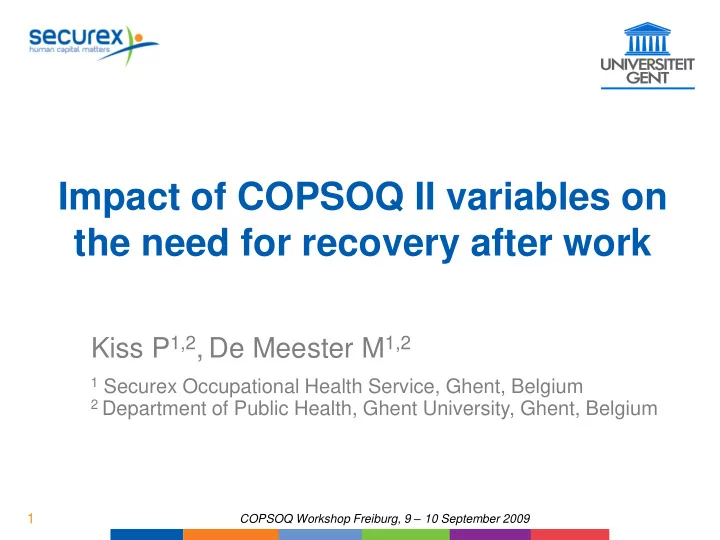

Impact of COPSOQ II variables on the need for recovery after work Kiss P 1,2 , De Meester M 1,2 1 Securex Occupational Health Service, Ghent, Belgium 2 Department of Public Health, Ghent University, Ghent, Belgium COPSOQ Workshop Freiburg, 9 – 10 September 2009 1
Aim • explore the impact of the COPSOQ II factors on the need for recovery • comparison with COPSOQ I COPSOQ Workshop Freiburg, 9 – 10 September 2009 2
Need for recovery insufficient recovery long term stress short term effects factors effects high job strain fatigue after psychosomatic day of work complaints COPSOQ need for recovery Sluiter JK et al. Ergonomics 1999; 42(4):573-583 Ursin & Eriksen. Psychoneuroendocrinology 2004; 29:567-592 COPSOQ Workshop Freiburg, 9 – 10 September 2009 3
Outcome variable •“ The Need for Recovery Scale ” questionnaire • 11 dichotomous (Y/N) items • scale 0 – 100 • high NFR: > 54 COPSOQ Workshop Freiburg, 9 – 10 September 2009 4
Occupational factors • psychosocial work strain: COPSOQ II • physical work strain • part time / full time • shift work (Y/N) • more than one employment COPSOQ Workshop Freiburg, 9 – 10 September 2009 5
Personal factors • age • gender • presence of musculoskeletal disorder • degree of stress coping (COPSOQ I) COPSOQ Workshop Freiburg, 9 – 10 September 2009 6
Family and social life factors • number of children at home • taking care of disabled or elderly people • degree of satisfaction on relationships with close relatives • degree of satisfaction on relationships with friends • degree of satisfaction on social contacts COPSOQ Workshop Freiburg, 9 – 10 September 2009 7
Univariate logistic regression analysis for the presence of a high need for recovery p OR (95%CI) Quantitative demands 1.035 (1.027-1.043) 0.000 1.026 (1.018-1.034) Work pace (tempo) 0.000 1.014 (1.007-1.021) Cognitive demands 0.000 Emotional demands 1.020 (1.013-1.026) 0.000 1.014 (1.006-1.022) Demands for hiding emotions 0.001 1.015 (1.008-1.023) Role conflicts 0.000 COPSOQ Workshop Freiburg, 9 – 10 September 2009 8
Univariate logistic regression analysis for the presence of a high need for recovery OR (95%CI) p Influence at work 0.990 (0.982-0.998) 0.011 0.999 (0.993-1.005) Possibilities for development 0.752 0.991 (0.986-0.997) Variation of work 0.003 Meaning of work 0.992 (0.985-1.000) 0.048 0.984 (0.977-0.991) Commitment to the workplace 0.000 COPSOQ Workshop Freiburg, 9 – 10 September 2009 9
Univariate logistic regression analysis for the presence of a high need for recovery p OR (95%CI) Predictability 0.990 (0.984-0.996) 0.001 Rewards (recognition) 0.000 0.989 (0.983-0.994) 0.992 (0.985-1.000) 0.048 Role clarity Quality of leadership 0.987 (0.982-0.993) 0.000 Social support from supervisor 0.984 (0.978-0.990) 0.000 Social support from colleagues 0.989 (0.981-0.996) 0.002 Social community at work 0.987 (0.980-0.994) 0.000 COPSOQ Workshop Freiburg, 9 – 10 September 2009 10
Univariate logistic regression analysis for the presence of a high need for recovery p OR (95%CI) Job insecurity 1.010 (1.006-1.016) 0.000 0.987 (0.980-0.994) Trust regarding management 0.000 0.988 (0.981-0.995) Mutual trust between employees 0.000 Justice and respect 0.985 (0.979-0.991) 0.000 COPSOQ Workshop Freiburg, 9 – 10 September 2009 11
Univariate logistic regression analysis for the presence of a high need for recovery p OR (95%CI) Sexual harassment 1.160 (0.306-4.402) 0.828 Threats of violence 0.423 1.311 (0.676-2.541) 2.315 (1.283-4.177) 0.005 Physical violence Bullying 1.708 (1.095-2.663) 0.018 2.185 (1.437-3.321) 0.000 Unpleasant teasing Conflicts and quarrels 1.266 (0.957-1.674) 0.098 Gossip and slander 1.849 (1.391-2.457) 0.000 COPSOQ Workshop Freiburg, 9 – 10 September 2009 12
Final multivariate logistic regression model for the presence of a high need for recovery COPSOQ II (n=1007) COPSOQ I (n=963) OR (95% CI) OR (95% CI) quantitative demands 1.03 (1.02-1.04) 1.04 (1.03-1.06) emotional demands 1.01 (1.00-1.02) demands for hiding emotions 1.01 (1.00-1.02) variation of work 0.99 (0.98-1.00) commitment to the workplace 0.99 (0.98-1.00) 0.99 (0.98-1.00) job insecurity 1.01 (1.00-1.02) 1.01 (1.00-1.02) gossip and slander 1.46 (1.04-2.06) degrees of freedom 0.99 (0.98-0.99) degree of stress coping 1.02 (1.00-1.04) physical strain 1.01 (1.00-1.02) 1.01 (1.00-1.02) full time work 1.83 (1.26-2.65) 1.50 (1.06-2.13) gender (women vs. men) 1.71 (1.16-2.52) satisf. social contacts not very (vs. very) 7.51 (2.87-19.62) 8.49 (3.10-23.27) fairly (vs. very) 2.16 (1.55-3.02) 2.38 (1.69-3.35) COPSOQ Workshop Freiburg, 9 – 10 September 2009 13
Inclusion of “degrees of freedom at work” in the COPSOQ II regression model for high NFR without freedom with freedom (n=1007) (n=953) quantitative demands 1.03 (1.02-1.04) 1.04 (1.03-1.05) emotional demands 1.01 (1.00-1.02) variation of work 0.99 (0.98-1.00) 0.99 (0.98-1.00) job insecurity 1.01 (1.00-1.02) 1.01 (1.00-1.02) commitment to the workplace 0.99 (0.98-1.00) gossip and slander 1.46 (1.04-2.06) 1.50 (1.05-2.14) degree of freedom 0.98 (0.98-0.99) physical strain 1.01 (1.00-1.02) 1.01 (1.00-1.02) full time work 1.83 (1.26-2.65) 1.64 (1.15-2.33) gender (women vs. men) 1.71 (1.16-2.52) satisf. social contacts not very (vs. very) 7.51 (2.87-19.62) 8.94 (3.30-24.24) fairly (vs. very) 2.16 (1.55-3.02) 2.30 (1.64-3.25) COPSOQ Workshop Freiburg, 9 – 10 September 2009 14
Degrees of freedom at work • descriptives • Cronbach’s alfa: 0.66 • mean: 36.3 (SD 21.1) • suggestion for further research : • incorporation of degrees of freedom ? • interaction with work-family-conflict ? COPSOQ Workshop Freiburg, 9 – 10 September 2009 15
How further in Belgium ? • incorporated in the RAGOW • risk analysis for health of older workers • recognised for (partial) funding by the “Professional Experience Fund” of the Ministry of Employment and Labour • more use in private sector • French version COPSOQ Workshop Freiburg, 9 – 10 September 2009 16
Recommend
More recommend